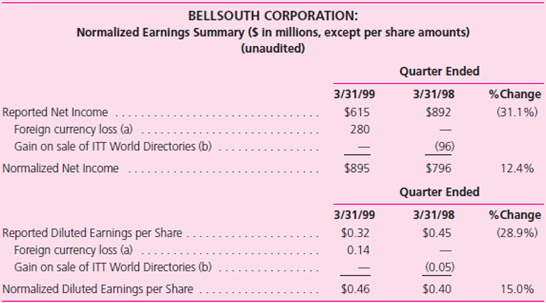
Advanced Accounting 10th Edition by Thomas Schaefer, Joe Ben Hoyle, Timothy Doupnik
Edition 10ISBN: 978-1260575910
Advanced Accounting 10th Edition by Thomas Schaefer, Joe Ben Hoyle, Timothy Doupnik
Edition 10ISBN: 978-1260575910 Exercise 22
BellSouth Corporation invested in two wireless communications operations in Brazil in the mid-1990s that it accounted for under the equity method.The following note is taken from BellSouth Corporation's interim report for the quarter ended March 31, 1999:
Note E-Devaluation of Brazilian Currency
We hold equity interests in two wireless communications operations in Brazil.During January 1999, the government of Brazil allowed its currency to trade freely against other currencies.As a result, the Brazilian Real experienced a devaluation against the U.S.Dollar.The devaluation resulted in the entities recording exchange losses related to their net U.S.Dollar-denominated liabilities.Our share of the foreign exchange rate losses for the first quarter was $280.
These exchange losses are subject to further upward or downward adjustment based on fluctuations in the exchange rates between the U.S.Dollar and the Brazilian Real.
In a press release announcing first quarter 1999 results, BellSouth Corporation provided the following information (on its Web site):
BellSouth Corporation (NYSE: BLS) reported a 15 percent increase in first quarter earnings per share (EPS) before special items.EPS was 46 cents before a noncash expense of 14 cents related to Brazil's currency devaluation.
Required
Based on the disclosure provided by BellSouth Corporation presented here, answer these questions:
a.Why did the company report a foreign currency loss as a result of the devaluation of the Brazilian real
b.What does the company mean when it states, "These exchange losses are subject to further upward or downward adjustment based on fluctuations in the exchange rates between the U.S.Dollar and the Brazilian Real"
c.What is the company's objective in reporting Normalized Net Income
d.Do you agree with the company's assessment that it had a 15 percent increase in first-quarter earnings per share
Note E-Devaluation of Brazilian Currency
We hold equity interests in two wireless communications operations in Brazil.During January 1999, the government of Brazil allowed its currency to trade freely against other currencies.As a result, the Brazilian Real experienced a devaluation against the U.S.Dollar.The devaluation resulted in the entities recording exchange losses related to their net U.S.Dollar-denominated liabilities.Our share of the foreign exchange rate losses for the first quarter was $280.
These exchange losses are subject to further upward or downward adjustment based on fluctuations in the exchange rates between the U.S.Dollar and the Brazilian Real.
In a press release announcing first quarter 1999 results, BellSouth Corporation provided the following information (on its Web site):
BellSouth Corporation (NYSE: BLS) reported a 15 percent increase in first quarter earnings per share (EPS) before special items.EPS was 46 cents before a noncash expense of 14 cents related to Brazil's currency devaluation.

Required
Based on the disclosure provided by BellSouth Corporation presented here, answer these questions:
a.Why did the company report a foreign currency loss as a result of the devaluation of the Brazilian real
b.What does the company mean when it states, "These exchange losses are subject to further upward or downward adjustment based on fluctuations in the exchange rates between the U.S.Dollar and the Brazilian Real"
c.What is the company's objective in reporting Normalized Net Income
d.Do you agree with the company's assessment that it had a 15 percent increase in first-quarter earnings per share
Explanation
FASB:
FASB is an abbreviation of Financ...
Advanced Accounting 10th Edition by Thomas Schaefer, Joe Ben Hoyle, Timothy Doupnik
Why don’t you like this exercise?
Other Minimum 8 character and maximum 255 character
Character 255


